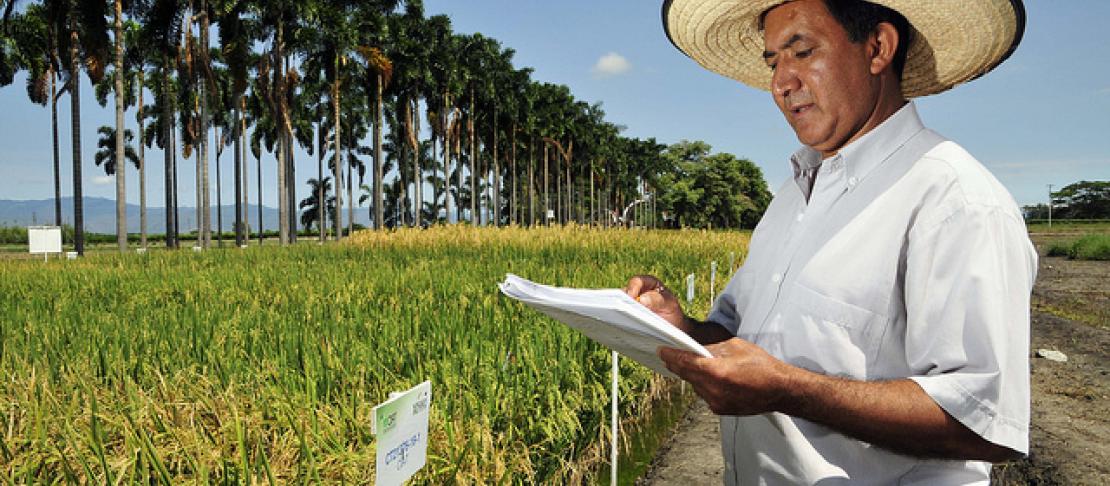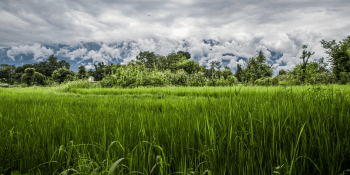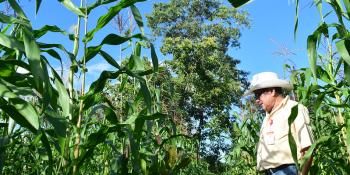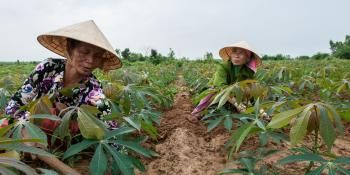Ground-breaking CIAT-CCAFS initiative wins UN Momentum for Change award

ICT tools and applications that help farmers in Colombia and Honduras make climate-smart decisions is a game-changer for farmers, according to the UN.
Supporting farmers with weather and climate information services for agricultural decision-making is an essential strategy for enhancing food security in already vulnerable areas, and a key component of climate-smart agriculture (CSA). Access to climate information helps farmers adapt their practices to climate change, thereby increase productivity and resilience to climate variability.
Yesterday, an initiative led by the International Center for Tropical Agriculture (CIAT) and the CGIAR Research Program on Climate Change, Agriculture and Food Security (CCAFS) received the United Nations Momentum for Change Climate Solutions Award for their work on climate services in Latin America. Apart from this project, 18 other ground-breaking initiatives from around the world received the prestigeuous award.
The CIAT-CCAFS project has developed tools and applications to collect, analyze, and deliver information to farmers that help them access climate and crop management information.
In a recent post on the CIAT blog, Maria Eliza Villarino describes the project:
Since 2013, the winning team has worked with government institutions at national and local levels, national growers’ associations, and weather agencies in the two countries to provide farmers with advice on which crops to grow, and if and when to plant. The farmers were then able to choose the action that best suited their needs.
Firstly, the team set up online systems to capture and disseminate crop and climate information. Then they used innovative approaches in modelling, climate forecasting, big data analysis, and artificial intelligence to develop the recommendations for farmers. They discussed and analyzed these with local partners, who in turn shared them with farmers through an online platform, monthly bulletins, and regular meetings.
Through the project, around 300,000 farmers have access to timely and reliable climate information and in the medium-term, the project is expected to reach 1,500,000 farmers.
Read more about the project:
- Learn more about the project in Maria Eliza Villarino's post on the CIAT blog: CIAT-led climate adaptation work in Latin America wins coveted UN award
- CCAFS 2016 Annual Report story: Weather and climate information, South-South cooperation help farmers in Colombia and Honduras manage climate change
- Tailored agro-climate services and food security information for better decision making in Latin America
- Big Data for climate-smart agriculture
Read more about the award on the UNFCCC website:
- ICTs For Small-Scale Farmers: A Game Changing Approach to Climate Smart Agriculture in Latin America | Colombia and Honduras
- Winners of 2017 UN Climate Solutions Awards Announced
Partners and donors include: the Colombian National Federation of Rice Growers; Colombian Association for Fruits and Vegetables; the National Federation of Cereal and Grain Legume Growers; the Colombian National Institute of Hydrology, Meteorology, and Environmental Studies; National Directorate of Science and Technology, Honduras; Agronet; Local Technical Agro-climatic Committees; the Honduran Permanent Committee for Contingencies; the Honduran Secretariat of Agriculture and Livestock; the Colombian Ministry of Agriculture and Rural Development; the Climate Services for Resilience Development Program of the U.S. Agency for International Development; and The Nature Conservancy.
Lili Szilagyi is the Communications consultant for the CCAFS Program Management Unit and CCAFS East Africa.



